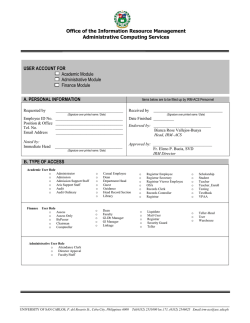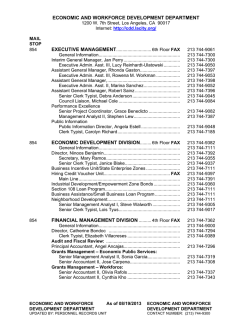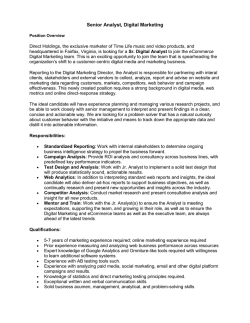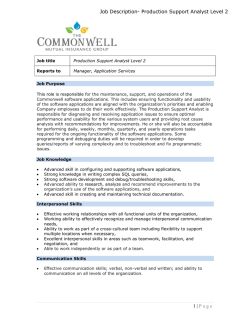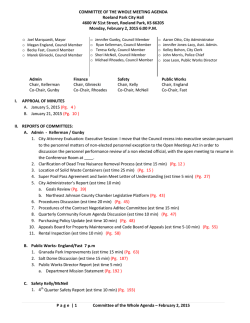
IRVINE VALLEY COLLEGE ISTJ
IRVINE VALLEY COLLEGE MYERS-BRIGGS PERSONALITY DESCRIPTION GUIDANCE AND COUNSELING ISTJ In general, ISTJs are systematic, painstaking, thorough, and hardworking. They get the job done and complete it on schedule. They are serious and sincere in whatever they do. They work well within structure, follow the hierarchy, and are particularly strong and careful in keep track of facts and details. They are cautious, generally seeking to maintain the status quo. They are at their best getting thing to the right place at the right time. They honor their commitments. Living: ISTJ children are serious, dutiful, and reserved. They like a great deal of order and structure. In new situation or with new people, they are quite cautious and perhaps even uncomfortable. They prefer familiar friends to new ones and select carefully. When they know what is expected, they act at ease with others. ISTJ children are keen observes who tend to focus on what is at odds at variance with the standard way of doing things. If a piece of furniture has been moved in the house, they ISTJ child notes it and sets out to determine why. ISTJs tend to enjoy traditional childhood activities such as learning to bake, cook, and repair broken things. When they feel comfortable, they also enjoy group activities such as scouting, with “doing their duty and serving their country” fitting their world view of what is right. ISTJ children like to be read to and appreciate hearing the story read with vocal intensity or tonal inflections. They enjoy the sounds of the stories and the pictures that accompany them. ISTJs particularly like stories in which good triumphs over the forces of evil. Horatio Alger- type stories, in which individuals achieve success in life through hard work and application, are particularly appealing. ISTJ children, perhaps more than others, enjoy having a schedule to follow and, even as kids, show a propensity for getting work-related responsibilities out of the way before they play. ISTJ teenagers are down-to-earth types who seek to do the appropriate thing at the appropriate time. If dating and dancing and being involved with parties are traditional at their school, ISTJs will participate in those activities. If they date, they tend to single out one person and date steadily. ISTJs may be chosen to lead school activities. ISTJs are often good role models for their teams and classmates. MYERS-BRIGGS PERSONALITY DESCRIPTION:ISTJ 2 ISTJs believe that one should earn one’s keep. Even as children, they may request chores that help the family. ISTJ teenagers, similar to other dutiful types, often have part-time jobs. They money they earn tends to be used for the important practical things in their lives, such as clothing, gasoline for cars, or, even more importantly, saving for college or other future needs. ISTJs do not like to ask their parents for money. As young adults, ISTJs begin their career training early and find it hard to understand people who start an education but do not complete it. They believe that dropping out is irresponsible. They complete what they start, representing traditional values and norms and pushing themselves to find early employment. They may choose large and stable organizations in which they hope to find security and an opportunity to prove their worth. It is not the size that is important, rather that large companies tend to have long track records that imply stability. They are particularly realistic about their skills and needs, and prefer to learn the basics before risking something beyond their capabilities. Slow and steadily on an unambiguous course is the way ISTJs prefer to navigate through life. As a result, they may select undergraduate programs in college that lead directly to employment. Some ISTJs chose liberal arts because of traditional values, particularly when a connection can be made to eventual employment. ISTJs have a need to “do right” with what they’ve been given, safeguarding traditions of the family and of the community. They often will take an extra responsibilities in order to maintain what they believe is important. Because ISTJs are stable, persistent, and thorough in their work, they are often rewarded by their organizations with positions of responsibility. If an organization needs to provide a reliable and consistent service or product, the ISTJ if often selected to manage it. They pay attention to precise requirements, strict schedules, and tight budgets, and quietly meet their deadlines, by filling in themselves if there are problems. Because ISTJs often seek work in stable organizations and then dutifully put in their time, they are usually eligible for retirement benefits. ISTJs may stay with job or company they do not particularly like because they tend to regard finical well- being as very important and are willing to do without things, including emotional gratification, so that they can provide for their retirement. They worry particularly about being dependent on others for their needs and work harder to avoid that state. Learning: ISTJs learn best and apply themselves most carefully in subject’s areas that are practical and useful. They are diligent and preserving in their studies. As learners, ISTJs tend to need materials, directions, and teachers to be precise and accurate if they are to trust the information that is presented. They prefer concrete and useful applications and will tolerate theory only if it leads to these ends. MYERS-BRIGGS PERSONALITY DESCRIPTION:ISTJ 3 ISTJs want learning materials to be correct in every detail and readily applicable. When details are inaccurate, ISTJs may be sidetracked and miss the larger conceptual framework. ISTJs like learning activities that allow them time to reflect and to think. If the material is too easy or appears to be too enjoyable, the ISTJs may be skeptical of its merit. Because of their practical bent, they believe that work is work and play is play. Therefore, their preferred learning environment is task oriented, starts and stops on time, and has clear and precise assignments. Laboring: At work, ISTJs get things done on a timely basis. They honor deadlines, and they believe in thoroughness. A half- finished job is not a job well done. When ISTJs give you their word that a project will be completed at a certain time, they will do whatever is necessary to make sure it is. They manage according to established procedures and schedules, and uncomfortable with those who do not the same. ISTJ put duty before pleasure. As long as they can fulfill their responsibilities, they feel useful and thereby stratified. Their work does not have to be fun, but it has to count toward something productive. ISTJs believe that vacations are something that one takes only when work has been accomplished; thus, at times they do not take vacations even when they could and should. Work Setting: ISTJs prefer work settings that’ contain hard-working people who are focused on facts, details, and results. They want structure, order, and some privacy for concentration without interruptions. They like tangible products and concrete accomplishments. They want to be secure and to be rewarded for their solid accomplishments at a steady pace. Because ISTJs believe that the tangible results of their work and their paycheck can be reward enough, they do not seek much attention for themselves, nor do they give much recognition to others, except for contributions clearly above and beyond the call of duty. Organizing Style: ISTJs pride themselves on their organization, yet often think it is still not quite good enough. They usually have a great deal of factual information to deal with, and they take pains to properly label and file it. They put emphasis on crossreferencing and easy retrievals. A hand- on approach is important to ISTJ, because they make use of the actual or the visual memory of the concrete data in their hands. They may not feel comfortable delegating to others since they do not feel fully on top of things without a thorough immersion in the data. ISJTs will put a high degree of effort into a project when it makes sense for them to do so, and their drive for completion keeps them going in a thorough and careful way when others would give up. Occupations: ISTJs prefer occupations that require thoroughness, accuracy, perseverance, and follow-through. They would rather work in situations in which they can see concrete, tangible results. MYERS-BRIGGS PERSONALITY DESCRIPTION:ISTJ 4 While ISTJs can do enter all occupations, some are more appealing to them than others. According to available research, some occupations (in alphabetical order) seem to be especially attractive to ISTJs: accountant, auditor, dentist, electrician, first-line supervisor, math teacher, mechanical engineer, police supervisor, steelworker, technician, and other occupations that allow for a thorough handling of facts. Leading: While not directly seeking leadership positions, ISTJs are often placed in such roles. They build a reputation for reliable, stable, and consistent performance that causes others to select them to lead. As leaders, ISTJs use their past experience and their factual knowledge in their decision making. They focus on the immediate, the practical and the tangible. They respect traditional, hierarchical approaches and seek to reward those who get the job done by following the rules and standard operating procedures. In their view, rewards should go to outstanding contributors who do not violate the rules while completing their work. ISTJs are more task oriented than relationship oriented in their style. Since results speak louder than words, they may not verbally acknowledge the contributions of those they lead. They often pattern themselves after those who have led them, especially if that style produced results they liked. Seeing others use different styles that work may cause the ISTJs to loosen up. When there is no pattern or model for ISTJs, they are likely to lead by setting a standard and expecting others to do their duty. ISTJs know and carefully follow company polices and procedures. If a budget review is to be held at a certain time, it will be held then unless a higher priority supersedes it. Leisure: Leisure for ISTJs must be earned. Leisure-time activities usually take place after work is accomplished. If they engage in leisure before their work is done, it is usually because of the circumstances in which they find themselves. For example, an ISTJ with a fun-loving spouse might engage in more playful activities out of duty to that spouse. ISTJ parents may attend their children’s sporting events because they are specifically asked to be there. For ISTJs, leisure needs to have a purpose and a result, and a beginning and an end. Sociability with peers, mates, or children may also be sufficient reason to take recreation breaks. Out of duty, ISTJs may entertain and invite others into their homes. They are likely to make a habit of traditional get-togethers year after year, since they enjoy the security of customary things. ISTJs enjoy spending time alone and need to be aware of their potential to become isolated from others. For examples, they may become absorbed in watching television because it allows them time to reflect and yet appear to be doing something. This time may also be an opportunity for them to be physically present with their family, though in some cases somewhere else mentally. Loving: For the ISTJs, love means commitment, steadiness, and consistency. ISTJs expect themselves and their mates to be responsible, practical, and dependable. When in a relationship, they behave MYERS-BRIGGS PERSONALITY DESCRIPTION:ISTJ 5 appropriately for what the situation or their role demands. For example, if the relationship is in the courting stage, the ISTJ will exhibit courting behaviors, such as giving boxes of candy, red roses, traditional cards, and presents. These are worthwhile and important traditions to uphold and observe because they give direct evidence of commitment. When ISTJs give their word and are ready to settle down, they follow through. Because they are dutiful, they expect their partners to behave in a similar fashion. When their partners do not, the ISTJs may accept this fact and make exceptions but still feel uncomfortable internally. ISTJs offer their partners stability and security. They do sensible things for the relationship, such as paying the bills and making household repairs. With their practical outlook, they often do not see the need to glamorize much in their lives. ISTJs may stay poor relationships out of their sense of duty, even when it is to their benefit to leave. They prefer the certainty of the current relationship to any future unknowns. When feeling scorned, ISTJs may not let their partners or others know it. Because they focus internally and because the facts al support the conclusion that the relationship is over, ISTJs may feel redundant to express to their partners or others what is going on. When it seems clear to the partners that the relationship really is over, ending it is the practical thing to do. However, when a decision to part is not so clear to ISTJs, they may continue to rehash the past rather than look to the future and other relationships. Losing Out: Each type has the potential to overuse or abuse its preferences. This is likely to happen when individuals are under great stress or pressure. At these times, they may act in ways that are unlike their usual style. The following paragraphs describe some of the ways ISTJs may lose out, in addition to some strategies that they can use to get back on track. For ISTJs, one way of losing out has to do with the overuse of their ability to immerse themselves in detail. They may become rigid in their ways and be thought of as inflexible, interpreting the letter of the law and not reckoning with the spirit behind it. Rather than attend to the overall meaning suggested by details, ISTJs can become details bound, overwhelming others with minute details and ignoring the larger issues. As a strategy, ISTJs need to focus on the overall objective and not become distracted by facts and details. ISTJs may want to ask themselves questions such as: What am I trying to accomplish? What other alternatives might get me there? ISTJs may overlook interpersonal niceties, such as complimenting people, in favor of getting the job done. Rather than making direct personal comments to show others they care about them, they may keep their compliments inside. Some ISTJs rely too heavily on written forms of communication. By concentrating on praising others more often and doing what is necessary to show both personal and professional interest in them, ISTJs gain added benefits for their projects and tasks. ISTJs might want to meet more frequently with their colleagues, both formally, to gain important and practical information about what is important to them. MYERS-BRIGGS PERSONALITY DESCRIPTION:ISTJ 6 Another way ISTJs may lose out is through overlooking the long-range implications in favor of day-to- day realties. ISTJs may be helped by the realization that the world is changing and that, in order to retain what they value, it is necessary to anticipate how they want to change. Without a clear-cut, step-by-step method approaching the future, ISTJs find it difficult to construct a vision. They may rely too much on the standard way and ignore the innovation. While the readily focus on what will not work, they may overlook subsequent changes in people and the environment that could make a new way possible. ISTJs can draw upon their ability to see the details and to move forward in a step-by-step way. They should not allow themselves on concentrate on what is not working right now, but rather push themselves to focus on at least three possibilities and options that have a potential for working out. They need to avoid getting stuck in a rut and seeing the future in doom-and-gloom terms. Some ISTJs may lose out by not recognizing their emotions and the values that they represent. Knowing this would advance their own self-understanding and their understanding of others. They may be seen as insensitive. Values clarification may help them recognize their own feelings and those of others. By dealing directly with their feelings, ISTJs will find that they are less likely to explode. They will also find that others enjoy workings with them more when they show more human sensitivity. When ISTJs are back on track, they are using their strengths of recognizing the pertinent facts and applying experience to problems that need current attention. They can be tireless in the following through to do their duty. THE ABOVE TYPE DESCRIPTION IS ADAPTED FROM LIFETYPES BY SANDRA HIRSCH AND JEAN KUMMEROW. 0388 WCISTJ.021 MYERS-BRIGGS PERSONALITY DESCRIPTION:ISTJ Suggested Careers for ISTJs Abstractor Accountant Accounting Clerk Accounting Systems Expert Acupuncturist Aerial Photograph Interpreter Aerospace Librarian Agricultural Commodity Grader Apartment Building Superintendent Assembler Audiological Technician Audit Accounting Aide Auditor Bank Cashier Bank Comptroller Bank Credit Analyst Bank Lending Officer Billing Typist Biomedical Engineering Technician Bond Analyst Bookkeeper Brokerage Clerk Budget Officer Building Inspector Business Analyst Calculating Machine Operator Cephalometric Analyst Certified Public Accountant Charge Account Clerk Check Processing Clerk Claims Adjuster Coast Estimator Collections Clerk Collections Manager Composing Machine Operator Computer Operator Construction Estimator Construction Inspector Construction Materials Supervisor Court Reporter Credit Analyst Criminalist Data Base Manager Data Typist Dermatologist Dispensing Optician Documents Examiner Duplication Machine Operator Editor Electrical Inspector Electrical Test Engineer Electromyographic Technician Electronic Communication Technician Embalmer Estate Appraiser Estimator Export Clerk Fiber Technologist File Clerk Film Librarian Finance Company Manager Finical Statement Clerk Fingerprint Classifier Fire Inspector Foreign Exchange Clerk Forge Shop Supervisor Fruit and Vegetable Grader Gemologist Glass Inspector Grain Manager Harbor Master Health Science Librarian Heating Plant Superintendent Hospital Administrator Hospital Engineer Hospital Pharmacist Illuminating Engineer Insurance Claims Examiner Insurance Clerk Internal Auditor International Banker 7 MYERS-BRIGGS PERSONALITY DESCRIPTION:ISTJ Journal Clerk Law Enforcement Director Lawyer Legal Assistant Legal Stenographer Legislative Reporter Loan Interviewer Loan Officer Mail Clerk Mail Room Supervisor Maintenance Data Analyst Manifest Clerk Mechanical Inspector Media Clerk Medical Librarian Medical Records Clerk Medical Records Administrator Medical Technologist Medical Voucher Clerk Metallurgist Analyst Meter Inspector Microfilm Technologist Micrographics Services Supervisor Mineral Processing Engineer Mining Engineer Molded Parts Inspector Mortgage Accounting Clerk Mutual Department Manager Natural Gas Utilization Manager Occupational Safety and Health Inspector Office Clerk Offset Duplication Machine Operator Ophthalmic Lens Inspector Optician Order Clerk Order Department Supervisor Order Detailer Parcel Post Clerk Parts and Order Clerk Pawnbroker Payroll Clerk 0388 WCISTJ.021 Petroleum Engineer Petroleum Inspector Policy Loan Calculator Poultry Scientist Poultry Veterinarian Proofreader Provider Pulp and Paper Tester Purchasing Agent Real Estate Appraiser Record Clerk Securities Analyst Services Clerk Stationary Engineer Statiscal Clerk Stenotype Operator Stock Clerk Stockroom Supervisor Storage Battery Inspector Systems Analyst Tabulating Machine Operator Tax Accountant Tax Attorney Tax Attorney’s Secretary Tax Auditor Tire Technician Title Searcher Traffic Rate Clerk Trust Evaluation Clerk Ultra –sound Technologist Volume Computer Warehouse Manager Water Treatment-Plant Operator Weight Engineer Wharfinger Word Processing Specialist 8
© Copyright 2026

